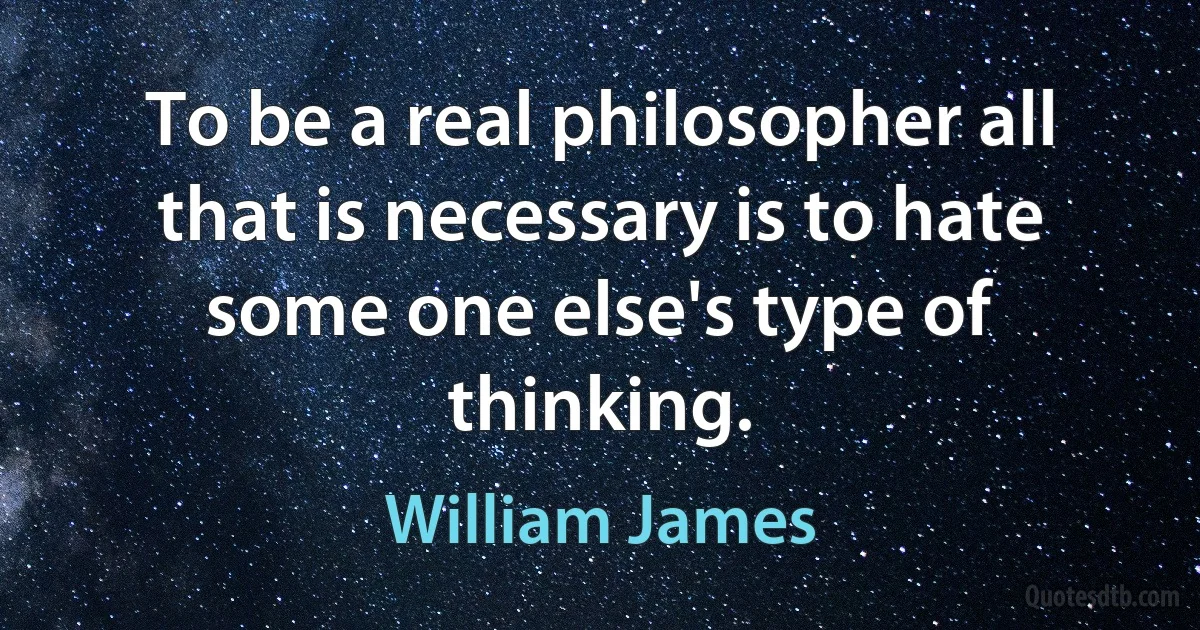Philosopher Quotes - page 6
While all these are disturbed and divided by the multifarious objects to which their thoughts must be applied, the Philosopher pursues, in solitary silence and in unbroken concentration of mind, his single and undeviating course towards the Good, the Beautiful, and the True; and that is his daily labour, to which others can only resort at times for rest and refreshment after toil.

Johann Gottlieb Fichte
It was God who breathed life into matter and inspired its many textures and processes. ...Rather than turn away from what he could not explain, he plunged in more deeply. ...There were forces in nature that he would not be able to understand mechanically, in terms of colliding billiard balls or swirling vortices. They were vital, vegetable, sexual forces-invisible forces of spirit and attraction. Later, it had been Newton, more than any other philosopher, who effectively purged science of the need to resort to such mystical qualities. For now, he needed them.

James Gleick
The man who won the argument, however, was John Locke, the Liberal philosopher, at that time acting as advisor to Sir Isaac Newton, then Warden of the Mint. Locke insisted that one can no more make a small piece of silver worth more by relabeling it a "shilling" than one can make a short man taller by declaring there are now fifteen inches in a foot.

David Graeber
We take pleasure in watching an athlete break a record, hearing a soprano in full flight, or reading a philosopher of depth and insight. Human accomplishment is the ultimate spectator sport. Apply as much historical analysis to it as we wish, and we'll not unlock all its mysteries. The continuous capacity of genius to surpass understanding remains a human constant.

Denis Dutton
The philosopher must teach these pupils [French students] that it is far less essential to understand nature than to enjoy and respect its laws; that these laws are both wise and simple; that they are written in all human hearts, and that one need merely question a heart in order to appreciate its impulses.

Marquis de Sade
An open society such as ours is based on the recognition that our understanding of reality is inherently imperfect. Nobody is in possession of the ultimate truth. As the philosopher Karl Popper has shown, the ultimate truth is not attainable even in science. All theories are subject to testing and the process of replacing old theories with better ones never ends.

George Soros
The next time I met Ludwig Wittgenstein was in the spring of 1928 when the economist Dennis Robertson, who was taking me for a walk through the Fellows' Gardens of Trinity College, Cambridge, suddenly decided to change course because on the top of a little rise he perceived the form of the philosopher draped over a deckchair. He evidently stood rather in awe of him, and he did not wish to disturb him.

Friedrich Hayek
When they asked some old Roman philosopher or other how he wanted to die, he said he would open his veins in a warm bath. I thought it would be easy, lying in the tub and seeing the redness flower from my wrists, flush after flush through the clear water, till I sank to sleep under a surface gaudy as poppies. But when it came right down to it, the skin of my wrist looked so white and defenseless that I couldn't do it. It was as if what I wanted to kill wasn't in that skin or the thin blue pulse that jumped under my thumb, but somewhere else, deeper, more secret, and a whole lot harder to get at.

Sylvia Plath
Labour, upon whichever of those operations it be bestowed, is productive, because it concurs in the creation of a product. Thus the labour of the philosopher, whether experimental or literary, is productive; the labour of the adventurer or master-manufacturer is productive, although he perform no actual manual work; the labour of every operative workman is productive, from the common day-labourer in agriculture, to the pilot that governs the motion of a ship.

Jean-Baptiste Say
The Machine Age's commitment to cause and effect was the source of many dilemmas, including the one involving free will. At the turn of the century the American philosopher E. A. Singer, Jr., showed that science had, in effect, been cheating. It was using two different relationships but calling both cause and effect. He pointed out, for example, that acorns do not cause oaks because they are not sufficient, even though they are necessary, for oaks. An acorn thrown into the ocean, or planted in the desert or an Arctic ice cap does not yield an oak. To call the relationship between an acorn and an oak ‘probabilistic' or ‘non deterministic causality,' as many scientists did, was cheating because it is not possible to have a probability other than 1.0 associated with a cause; a cause completely determines its effect. Therefore, Singer chose to call this relationship ‘producer-product' and to differentiate it from cause-effect.

Russell L. Ackoff
I suppose it is written that any one who sets up for a bit of a philosopher, must contradict himself to his very face. For here have I fairly talked myself into thinking that we have the whole thing before us at last; that there is no answer to the mystery, except that there are as many as you please; that there is no centre to the maze because, like the famous sphere, its centre is everywhere; and that agreeing to differ with every ceremony of politeness, is the only "one undisturbed song of pure concent” to which we are ever likely to lend our musical voices.

Robert Louis Stevenson
It is a greatness not of mere body and gigantic bulk, but a rude greatness of soul. There is a sublime uncomplaining melancholy traceable in these old hearts. A great free glance into the very deeps of thought. They seem to have seen, these brave old Northmen, what Meditation has taught all men in all ages, That this world is after all but a show,-a phenomenon or appearance, no real thing. All deep souls see into that,-the Hindoo Mythologist, the German Philosopher,-the Shakspeare, the earnest Thinker, wherever he may be.

Thomas Carlyle



